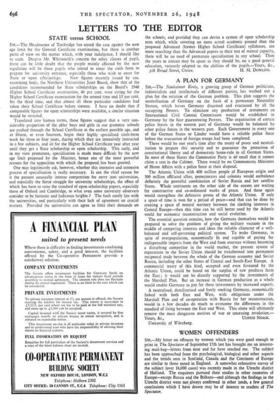LETTERS TO THE EDITOR
STATE versus SCHOOL
SIR,—The Headmaster of Tonbridge has stated the case against the new age limit for the General Certificate examination, but there is another point of view on the matter which, with your indulgence, I should like to state. Despite Mr. Whitworth's concern for other classes of pupil, there can be little doubt that the people mainly affected by the new regulation will be those pupils who intend to enter the sixth form to prepare for university entrance, especially those who wish to enter for State or open scholarships. Now figures recently issued by ont examining body, the Northern Universities Joint Board, show that of the candidates recommended for State scholarships on the Board's 1948 Higher School Certificate examination, 46 per cent. were sitting for the Higher School Certificate examination for the second time and 13 per cent. for the third time, and that almost all these particular candidates had taken their School Certificate before sixteen. I have no doubt that if comparable figures for open scholarships were available, a similar situation would be revealed.
Translated into human terms, these figures suggest that a very con- siderable proportion of the abler boys and girls in our grammar schools are pushed through the School Certificate at the earliest possible age, and at fifteen, or even fourteen, begin their highly specialised sixth-form work for three or four years, during which they are intensively instructed in a few subjects, and sit for the Higher School Certificate year after year until they get a State scholarship or open scholarship. This early, and in my view premature, specialisation is made more difficult by the new age limit proposed by the Minister, hence one of the most powerful reasons for the opposition with which the proposal has been greeted.
One may legitimately ask, however, whether this intensive and extensive process of specialisation is really necessary. Is not the chief reason for it the present unusually intense competition for entry into universities, and especially the fierce struggle for university scholarships, the effect of which has been to raise the standard of open scholarship papers, especially those of Oxford and Cambridge, to what even some university observers consider to be fantastic and ludicrous heights ? The fault surely lies with the universities, and particularly with their lack of agreement on crucial - matters. Provided the universities can agree to limit their demands on the schools, and provided they can devise a system of open scholarship tests which, while covering no more actual academic ground than the proposed Advanced (former Higher School Certificate) syllabuses, are more searching than the Advanced papers in their test of mental capacity, there will be no need of premature specialisation in any school: Then the years to sixteen may be spent as they should be, on a good general education, variously adapted to the abilities of the pupils.—Yours, &c.,




































 Previous page
Previous page